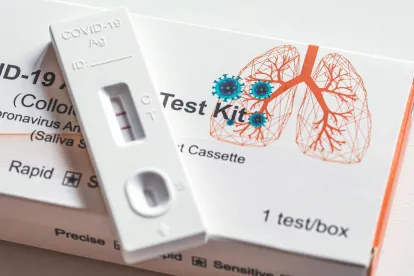As of January 15, 2022, fully-insured and self-insured group health plans are required to reimburse participants for the cost of purchasing over-the-counter (“OTC”) COVID-19 tests, even if such tests are purchased without the involvement of a health care provider. Combined guidance from three federal agencies clarified that section 6001 of the Families First Coronavirus Response Act (“FFCRA”), which generally requires group health plans to provide benefits for certain items and services related to testing for the detection or diagnosis of COVID-19 without any cost sharing or prior authorization, applies to OTC COVID-19 home tests approved by the FDA. As a reminder, the FFCRA only requires such coverage during the public health emergency period.
Testing for employment purposes, rather than for individualized diagnosis or treatment of COVID-19, does not need to be covered without cost sharing under section 6001 of the FFCRA.
To comply with the FFCRA, a group health plan must either (1) provide reimbursement directly to the sellers of OTC COVID-19 tests, referred to as “direct coverage,” or (2) provide reimbursement to a participant, including a beneficiary, that submits a claim for reimbursement to the group health plan. While the federal government is encouraging group health plans to provide direct coverage, it is likely that most group health plans will need participants to submit claims in order to provide reimbursement because of the short implementation period.
For group health plans that provide reimbursement to individuals that pay the cost of the OTC COVID-19 tests and then submit a reimbursement claim to the group health plan, a group health plan may implement the following safeguards to prevent abuse:
-
Each participant, including each beneficiary, must be able to receive reimbursement for no more than 8 tests per month;
-
A group health plan may take reasonable steps to ensure that an OTC COVID-19 test was purchased for the individual’s own personal use, or use by a covered member of their family, by requiring an attestation that the test was purchased for personal use; however, the reasonable steps must not create significant barriers to obtaining these tests; and
-
A group health plan may require reasonable documentation of proof of purchase with a reimbursement claim, including the UPC code from the test box and a receipt from the seller of the test.
Some of these safeguards are likely more helpful than others, especially for self-insured group health plans that are rightfully concerned about the cost of such a reimbursement program, including the possibility of abuse by participants.





 />i
/>i

